The Heart of Your Home's Cooling System
An air conditioning compressor is the mechanical heart of your AC. It pressurizes refrigerant and moves it through the system so your home stays cool during hot Pittsburgh summers.
Quick Facts About Your AC Compressor:
- What it does: Compresses and circulates refrigerant to remove heat from your home
- Where it is: Located in the outdoor unit (the large metal box outside your home)
- How long it lasts: Typically 10-15 years with proper maintenance
- Cost to replace: $900-$2,900 if not under warranty
- Why it matters: Without a working compressor, your AC cannot cool your home
When the AC stops blowing cold air, the compressor is often the culprit. By compressing refrigerant into a high-pressure, high-temperature state, it enables heat to move from indoors to outdoors. The compressor sits in your outdoor unit with the condenser coil and fan and runs on your home's electrical system.
Understanding your air conditioning compressor helps you spot early warning signs, choose repair vs. replacement wisely, and extend system life with maintenance.
I am Bill Scott, general manager of Smart Climate Solutions. After 15+ years serving Pittsburgh homeowners, I can tell you that proper compressor care is the difference between a quick fix and a costly emergency.
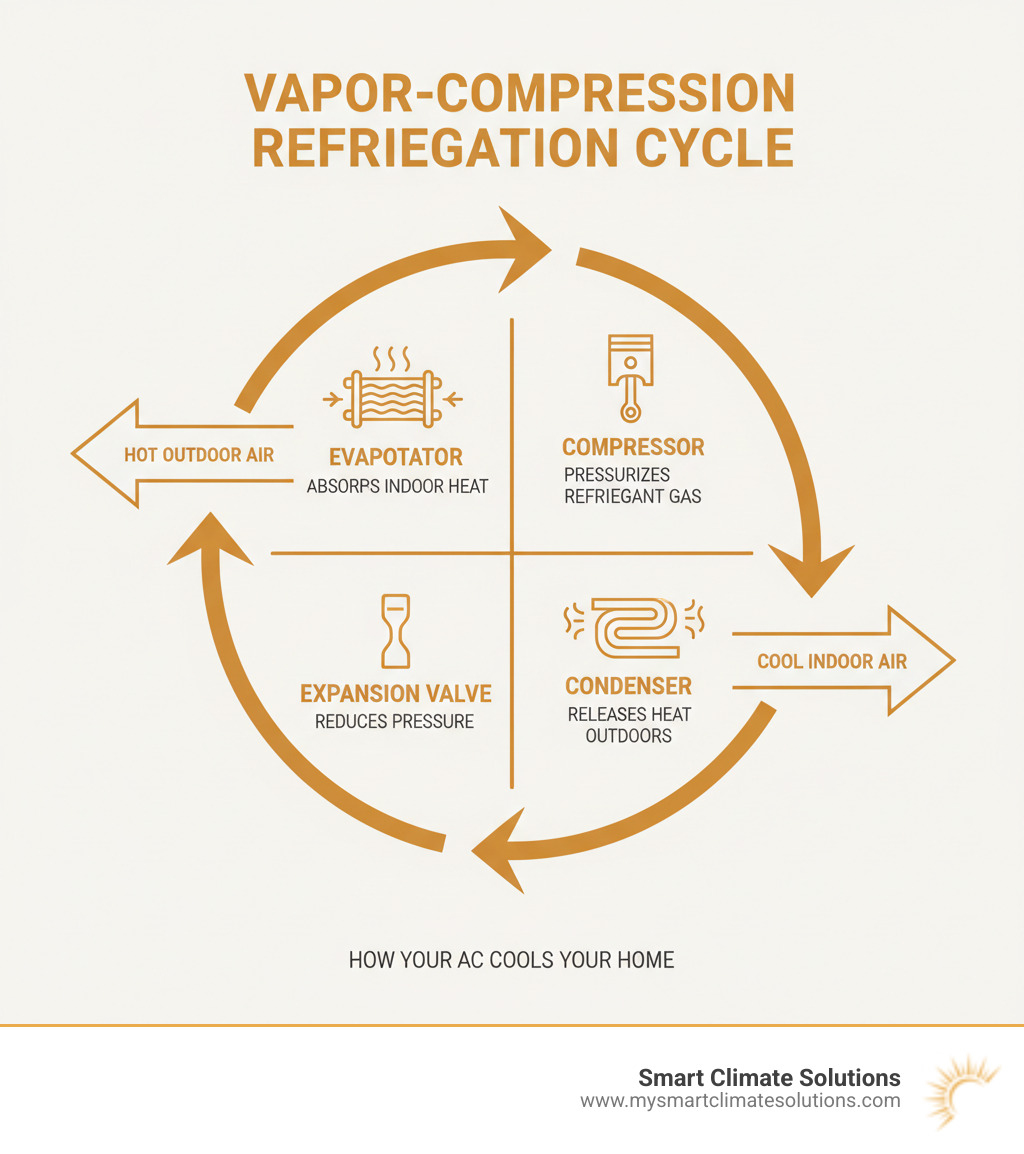
How Your Air Conditioning Compressor Works
Think of the compressor as the engine of your AC. It pulls in low-pressure refrigerant gas from the indoor evaporator coil and squeezes it into a high-pressure, high-temperature gas. That hot gas moves to the outdoor condenser coil, where a fan helps release heat to the outside air. As heat is shed, the refrigerant condenses into a high-pressure liquid.
Next, the liquid passes through the expansion valve, which drops its pressure and temperature. The now-cold, low-pressure liquid enters the indoor evaporator coil. Warm indoor air blows across the coil, the refrigerant absorbs heat, and it evaporates back into a gas. That gas returns to the compressor, and the cycle repeats until your thermostat setpoint is reached. The outdoor contactor and an electric motor start and power the compressor when your thermostat calls for cooling.
The Role of Refrigerant and Compressor Oil
Most modern home systems use R-410A; older systems may use phased-out R-22. Compressors are engineered for specific refrigerants and their pressures. Using the wrong refrigerant can destroy the compressor and contaminate the system.
Compressor oil lubricates internal parts and helps manage heat. R-410A systems typically use POE oil; older R-22 systems used mineral oil. Wrong type or incorrect oil level leads to friction, overheating, and failure. Because refrigerant and oil handling require precise charging and EPA-certified tools, leave this to a certified HVAC technician.
Is Your AC Compressor Failing? Key Symptoms and Causes
Your air conditioning compressor often gives early clues before it quits. A quick listen and visual check of the outdoor unit can help Pittsburgh-area homeowners catch problems early.
Common Symptoms of a Bad Air Conditioning Compressor
- Warm air from vents or not cool enough. When compressing is poor, heat exchange breaks down. See our HVAC Not Cooling Guide.
- Unusual outdoor unit sounds: grinding, squealing, clanking, or banging.
- Short cycling: frequent on-off cycles due to overheating or pressure issues.
- Circuit breaker trips when the system starts or runs.
- Visible oily residue or leaks near the outdoor unit. For airflow issues, see AC Isnt Blowing.
A healthy compressor runs with a steady hum, delivers cool air indoors, and pushes warm air out of the outdoor unit.
Top Causes of Compressor Failure
- Dirty condenser coils that block heat rejection.
- Low refrigerant from leaks, causing overheating.
- Moisture or air contamination from leaks or improper service.
- Electrical failures: weak capacitor, bad contactor, wiring or voltage problems.
- Contaminants (moisture, dirt, acid, metal particles) from improper install or repairs.
- Blocked suction lines or liquid slugging.
- Lack of regular maintenance that lets minor issues escalate.
Lifespan, Maintenance, and Replacement
Your air conditioning compressor is a major investment. Knowing how long it should last, how to care for it, and when to replace it will save money and reduce stress during Pittsburgh heat waves.
Lifespan and Longevity Factors
Most compressors last 10 to 15 years. Longevity depends on equipment quality, installation, usage patterns, local climate, and especially routine professional maintenance.
Essential Maintenance to Extend Your Air Conditioning Compressor's Life
Homeowners: replace air filters regularly and keep the outdoor unit clear of leaves, grass, and debris. Make sure indoor vents are open and unobstructed.
Pros: during annual tune-ups, our Smart Climate Solutions technicians clean condenser coils, verify refrigerant charge, and inspect electrical components. An AC Maintenance Plan helps prevent emergencies and extend life.
Repair vs. Replace: Making the Right Choice
| Factor | Repair Compressor | Replace Full Unit |
|---|---|---|
| Unit Age | Best if under 8 years old | Better option if 10+ years old |
| Warranty Status | Covered compressor = lower cost (labor only) | Out of warranty = expensive repair may not be worth it |
| Repair Cost | $900-$2,900 (parts + labor) | $3,500-$7,500+ (full system) |
| Energy Efficiency | Maintains current efficiency | New systems are 20-40% more efficient |
| Future Reliability | Older systems may have other components failing soon | New system with full warranty provides peace of mind |
| Overall Condition | Good option if rest of system is in excellent shape | Better if you have had multiple repairs recently |
Age, warranty, and overall system condition drive the decision. For pricing and process details, see our AC Compressor Repair Cost guide. We provide honest recommendations based on your system, budget, and comfort goals.
ARTICLE SPECIFICATIONS
- Topic: air conditioning compressor
- Format: Guide
KEY QUESTIONS TO ANSWER
- What is an AC compressor and what does it do?
- What are common symptoms of a failing compressor?
- How does it work in home ACs (contactor/motor, not clutch)?
- What is the typical lifespan and key factors?
- What commonly causes compressor failure?
- New vs. remanufactured vs. used compressors?
- What is the replacement process and what else gets replaced?
- How do refrigerants (R-410A vs. R-22) affect choice and function?
- What are signs a compressor is working correctly?
- What maintenance extends compressor life?
- What are typical repair or replacement costs?
- Are compressor types matched to different home systems/capacities?
- What is compressor oil, and how is it selected and added?
- How to tell compressor issues from leaks, clogs, or other problems?
The Heart of Your Home's Cooling System
An air conditioning compressor is the mechanical heart of your AC system that pressurizes refrigerant gas and circulates it through your cooling system, making it possible for your home to stay comfortable during hot Pittsburgh summers.
Quick Facts About Your AC Compressor:
- What it does: Compresses and circulates refrigerant to remove heat from your home
- Where it is: Located in the outdoor unit (the large metal box outside your home)
- How long it lasts: Typically 10-15 years with proper maintenance
- Cost to replace: $900-$2,900 if not under warranty
- Why it matters: Without a working compressor, your AC cannot cool your home
When cooling stops, the compressor is a frequent culprit. It compresses refrigerant so heat can move outdoors. Knowing the basics helps you spot trouble early and make smart repair-or-replace decisions in the Pittsburgh area.
How Your Air Conditioning Compressor Works
![IMAGE] of a detailed diagram of the refrigeration cycle in a home AC system
Think of your air conditioning compressor as the engine of your cooling system. It compresses low-pressure refrigerant gas into a high-pressure, high-temperature gas that releases heat outdoors, then helps move cold refrigerant back indoors to absorb heat from your air. Your thermostat signals the outdoor contactor, which powers the compressor and condenser fan when cooling is needed. For efficiency tips, see Energy Efficient Air Conditioning Systems.
The Role of Refrigerant and Compressor Oil
Modern systems use R-410A; some older units still run R-22. Each compressor is designed for its refrigerant's pressures. Using the wrong refrigerant can cause severe damage. The compressor also needs the correct oil (typically POE oil for R-410A systems) at the right level for lubrication and heat management. Always have certified HVAC technicians handle refrigerant and oil.
Is Your AC Compressor Failing? Key Symptoms and Causes
Your air conditioning compressor rarely fails without warning. A quick check can help you call for service before a bigger breakdown.
Common Symptoms of a Bad Air Conditioning Compressor
- Warm air from vents or not cold enough. See our HVAC Not Cooling Guide.
- Grinding, squealing, clanking, or banging at the outdoor unit.
- Short cycling or hard starting.
- Repeated breaker trips.
- Oily residue or leaks near the outdoor unit. For airflow issues, see AC Isnt Blowing.
A healthy compressor runs with a steady hum and your outdoor unit expels warm air.
Top Causes of Compressor Failure
Dirty condenser coils, low refrigerant from leaks, moisture or air contamination, electrical component failures, blocked lines, incorrect oil type/level, and lack of regular maintenance.
Lifespan, Maintenance, and Replacement
Your air conditioning compressor is built for 10 to 15 years, but installation quality, usage, climate, and maintenance determine how long it actually lasts.
Essential Maintenance to Extend Your Air Conditioning Compressor's Life
Change filters routinely, keep the outdoor unit clear, and ensure vents are open. Professional tune-ups from Smart Climate Solutions include coil cleaning, refrigerant verification, and electrical checks. An AC Maintenance Plan helps avoid emergencies.
Repair vs. Replace: Making the Right Choice
If the system is young and under warranty, repair tends to make sense. Older systems, especially with R-22 or frequent repairs, often justify replacement. Review our AC Compressor Repair Cost guide for typical pricing.
The Heart of Your Home's Cooling System
An air conditioning compressor is the mechanical heart of your AC system that pressurizes refrigerant gas and circulates it through your cooling system, making it possible for your home to stay comfortable during hot Pittsburgh summers.
Quick Facts About Your AC Compressor:
- What it does: Compresses and circulates refrigerant to remove heat from your home
- Where it is: Located in the outdoor unit (the large metal box outside your home)
- How long it lasts: Typically 10-15 years with proper maintenance
- Cost to replace: $900-$2,900 if not under warranty
- Why it matters: Without a working compressor, your AC cannot cool your home
In short, the compressor enables the heat-exchange cycle that cools your air. Understanding it helps Pittsburgh homeowners act quickly when performance changes.
How Your Air Conditioning Compressor Works
Your air conditioning compressor drives the vapor-compression cycle: compress gas, release heat outside, expand to cool, absorb indoor heat, and repeat. The thermostat controls the outdoor contactor that powers the compressor and fan. Learn how to boost efficiency here: Energy Efficient Air Conditioning Systems.
The Role of Refrigerant and Compressor Oil
Use the refrigerant your system is designed for (most modern homes use R-410A). Pair it with the correct compressor oil (typically POE for R-410A). Wrong refrigerant or oil can cause rapid failure. Certified HVAC techs should handle both.
Is Your AC Compressor Failing? Key Symptoms and Causes
Like a car engine, a failing compressor often makes noise or trips breakers before it quits. Catching issues early prevents major repairs.
Common Symptoms of a Bad Air Conditioning Compressor
- Warm supply air when cooling is on. See our HVAC Not Cooling Guide.
- Loud grinding, squealing, or clanking outdoors.
- Short cycling or hard starting.
- Breaker tripping.
- Oily spots or visible leaks. For airflow issues, see AC Isnt Blowing.
Top Causes of Compressor Failure
Dirty coils, low charge from leaks, contamination, electrical faults, blocked lines, incorrect oil, and skipped maintenance.
Lifespan, Maintenance, and Replacement
Your air conditioning compressor typically lasts 10 to 15 years with proper installation and maintenance.
Essential Maintenance to Extend Your Air Conditioning Compressor's Life
Replace filters regularly, clear debris from the outdoor unit, and schedule pro tune-ups. Our team cleans coils, checks charge, and inspects electrical parts. Consider an AC Maintenance Plan.
Repair vs. Replace: Making the Right Choice
Younger units under warranty often merit repair; older systems or those on R-22 may be better replaced. See our AC Compressor Repair Cost guide for typical ranges.

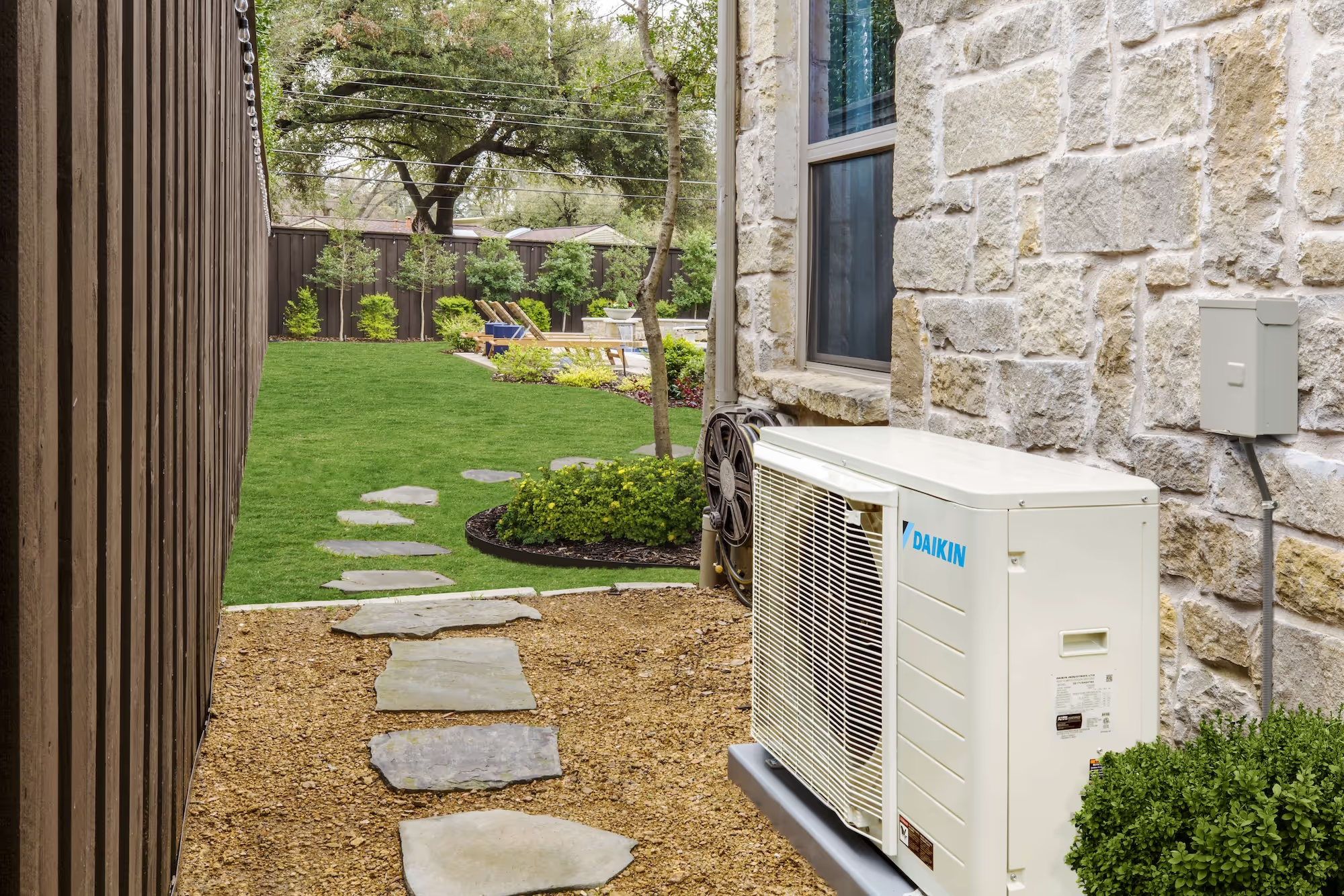

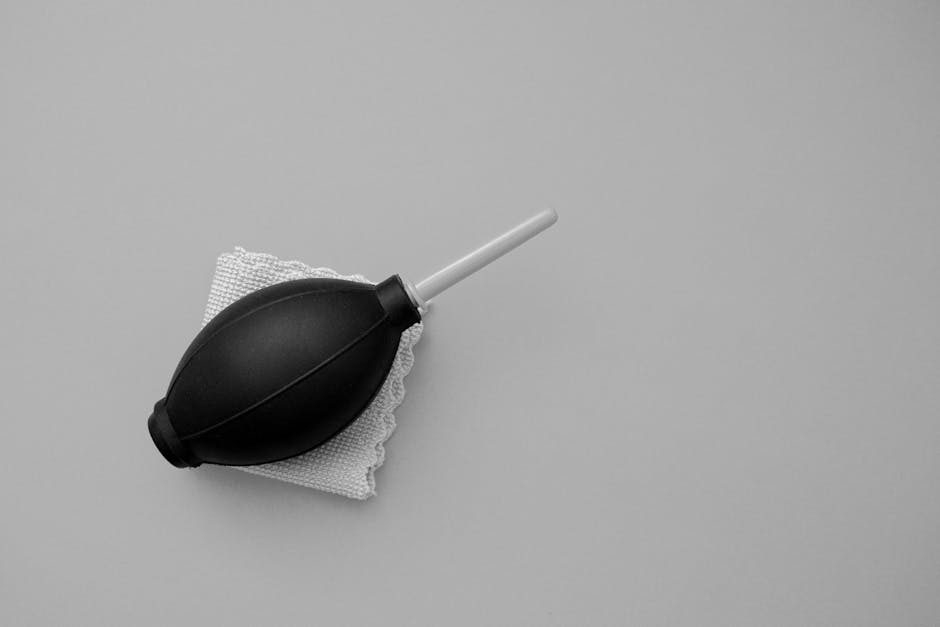
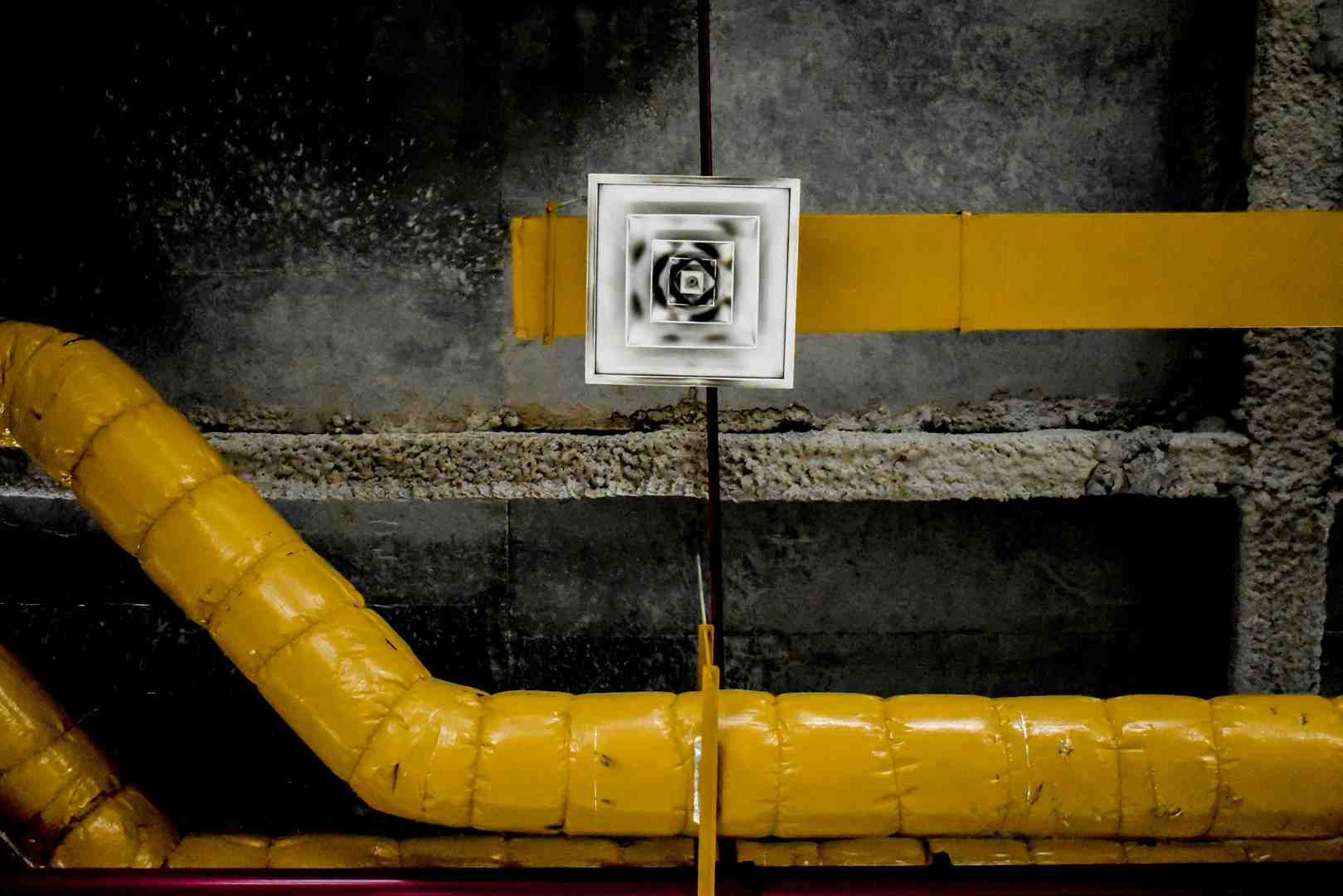
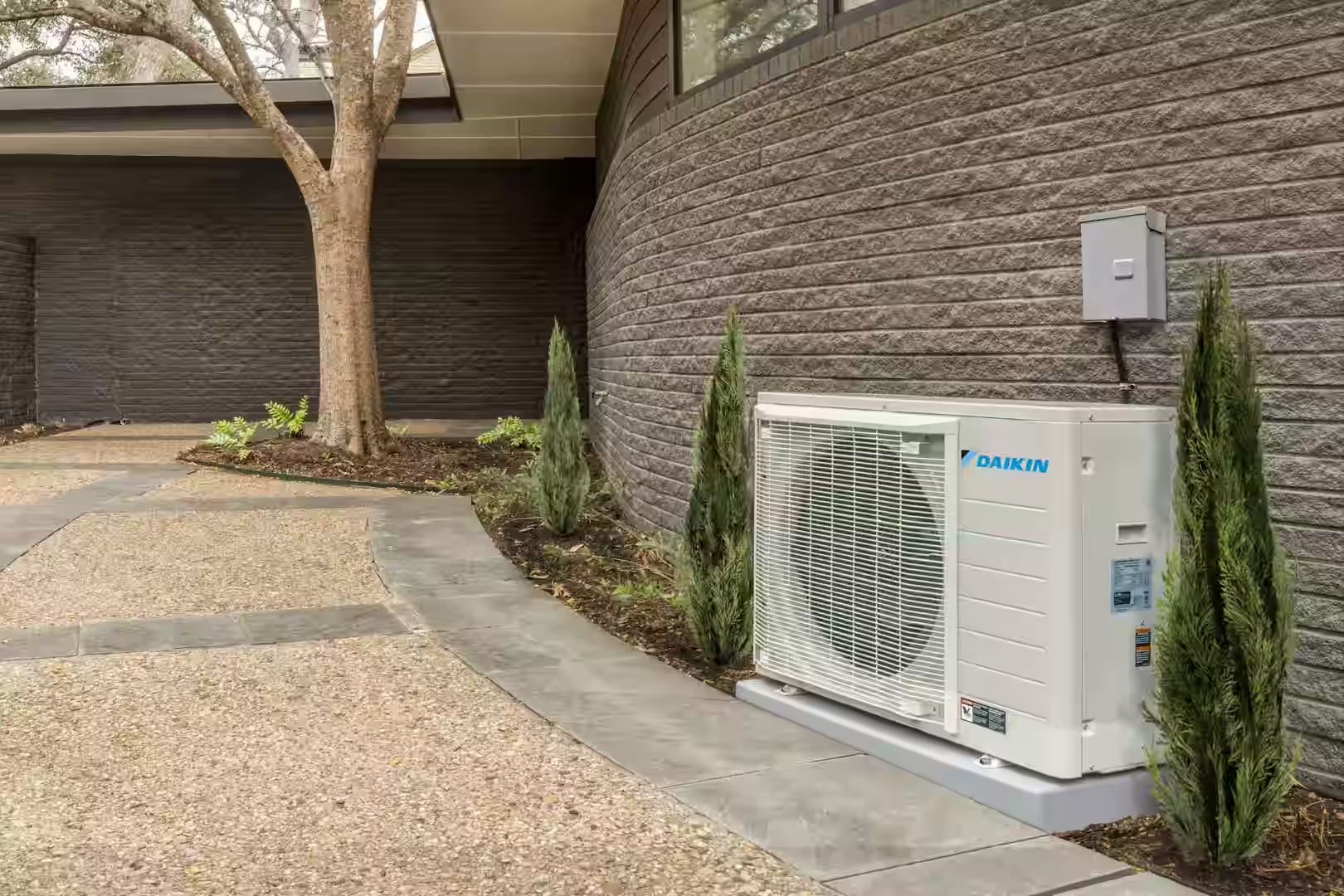
.png)
